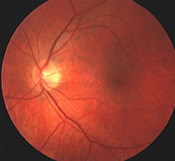DIABETIC RETINOPATHY
 Many older adults have diabetes, a disease in which the body does not use or store sugar properly.
Many older adults have diabetes, a disease in which the body does not use or store sugar properly.
Diabetes can cause changes in the blood vessels, the veins and arteries that carry blood throughout your body.
Diabetes can affect your vision by causing cataracts, glaucoma and, most importantly, damage to blood vessels inside the eye.
When blood vessels in the retina are damaged, they may leak fluid or blood, and grow fragile brush-like branches and scar tissue. This can blur or distort the images that the retina sends to the brain and is called diabetic retinopathy.
You can have serious, sight-threatening retinopathy without any symptoms. People with diabetes should have medical eye examinations as recommended by their ophthalmologist, usually at least once a year.
Laser surgery is the most common treatment for diabetic retinopathy. It often does not return vision to normal, but is very helpful in preventing continued loss of vision.
The best protection against loss of vision from diabetic retinopathy is to have regular medical eye examinations by your ophthalmologist.
Most older people have good vision. If you do develop a vision problem, early diagnosis and treatment by an ophthalmologist can help to preserve useful vision.

